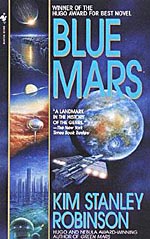
![]() Tar Daddoo
Tar Daddoo
11/9/2013
![]()
[Blue Mars is the third book in Kim Stanley Robinson's Mars trilogy. My review of the first book, Red Mars, is here. My review of the second book, Green Mars, is here.]
What is the Science Fiction Premise?
Blue Mars continues the Science Fiction premises begun in the earlier Mars books, namely planetary colonization and terraforming. Like the earlier books, these premises touch on many sciences, including biology, areology (geology on Mars), climatology, and so forth. Blue Mars also continues the premise introduced in the earlier books concerning medical treatments that extend life.
Is the science of the premise explored?
As in the earlier books, Blue Mars has lengthy sections that delve into the details of terraforming Mars. The scientific discussion is quite plausible. The whole trilogy is a primer for Mars colonization.
The longevity treatments are discussed in greater detail in Blue Mars than in the earlier books. The theory behind the longevity treatments still seems a bit soft, but the implications, refinements, constraints, and limitations are explored nicely.
Is the impact of the premise on an individual explored?
Blue Mars is capping off a lengthy and ambitious work begun in Red Mars. Most of the main characters followed in this book were introduced in either the first or second book. Only one new character is followed in any detail. For all these characters, we learn how they have come to terms with living on Mars and living to a very old age. For a brief segment, we are also given a glimpse of life on Earth as seen through the eyes of Martians.
Is the impact of the premise on society explored?
In Blue Mars, the Martians take control of their own political life. There is considerable thought given to crafting a constitution, including descriptions of how ecological and terraforming concerns should be managed. From there, we learn about the many different niches that Martian society settles into, the challenges of dealing with Earth, and the growth of politics and politicians.
How well written is the story?
Blue Mars is well written, but it is long. While it is much like the earlier books in style, I found Blue Mars more tedious than its predecessors. All the books have lengthy passages describing detailed scientific concerns and lengthy travelogs as characters take trips across the surface of Mars. I doubt these sections were written differently in Blue Mars. Instead, I would guess that I was simply more forgiving when it was all new and more bored as it became familiar.
I also found it more difficult to discern a single story pulling all the strands together. Unlike Green Mars with its culminating revolution, Blue Mars was more like a collection of multiple narratives. I found the early story surrounding establishing a government somewhat engaging; I found the later story about the limits of the longevity treatment interesting; and I appreciated the culmination of many of the personal relationships. But, I did not see why they needed to be together in one book.
Can I recommend the book?
If you have not read the earlier books in the trilogy, you should not be reading this review.
If you have read the earlier books and were not impressed, I doubt Blue Mars will vindicate the trilogy. In my opinion, Green Mars was the best of the three. In all likelihood, whatever made you dislike the earlier books is continued in Blue Mars and the new elements will not make a sufficient difference.
If you have read the earlier books and are inclined to read Blue Mars, then do it. Its style and concerns will be very familiar to you. I doubt you would want to miss learning how Robinson projects Mars, the Earth, Science, technology and politics forward into the future. Moreover, if you've grown at all attached to the characters, you will want to know how things turn out for them. Although I did not feel this book was as good as the earlier ones, I am glad I read it.